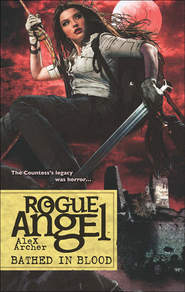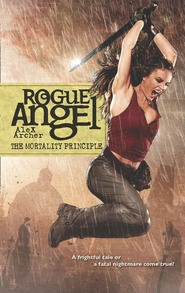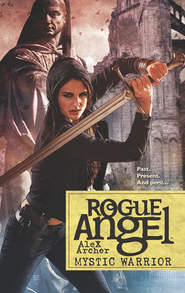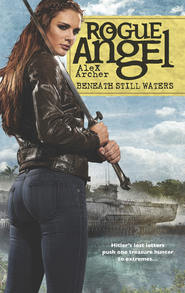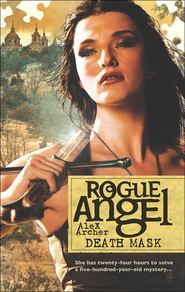По всем вопросам обращайтесь на: info@litportal.ru
(©) 2003-2025.
✖
Eternal Journey
Автор
Год написания книги
2019
Настройки чтения
Размер шрифта
Высота строк
Поля
Shoes, she needed shoes and socks, she thought, a long-sleeved shirt and maybe a sweater. And her cell phone—any phone—so she could call Doug and try Oliver again. She needed to call the police, too.
She needed to think.
Annja let the bus rock her, hoping it would relax her, but instead she felt more anxious. In her mind’s eye she saw Oliver’s empty room and the spot of blood. She saw the faces of the men who’d attacked her, their hard, cold eyes, and then the lifeless bodies of the ones she’d killed. The tall one called Sute loomed large in her memory. Something about him bothered her—beyond her killing him. She didn’t regret what she’d done. She’d had no choice. Sadly, killing had become somewhat commonplace in her life. At least she hadn’t become so inured to it that she didn’t feel anything. She felt sorry for the dead men’s families. And she was sorry she had not been able to capture one and ask him questions.
She focused on the sounds around her and tried to clear her mind. The spot of blood faded, and instead she called up the image of Hathor on the piece of pottery Wes Michaels had passed to her. Smooth and warm, she remembered the shard feeling, somehow, comforting.
The sirens had receded completely now.
She heard someone on the street hollering for a cab, heard a vendor calling to passersby, “Avos! Ripe avos here.” A car horn was honking, music spilling out a window. The roar of a piece of construction equipment was the loudest; on the shuttle to the hotel a few days ago she’d noted a parking garage going up and an old furniture store being torn down. They must be passing that spot, she thought.
A few moments later the bus slowed, then squeaked and belched exhaust before shuddering to a stop. She could tell they were at a traffic light from the clacking of heels and chattering of all the people crossing the street.
The smells of the city intensified. From herself, the scents of blood and sweat hung heavy in her nostrils. There were warring perfumes from the women in the seats ahead of her. Added to that were the acrid aromas of the bus’s fumes and those from other cars, and the general miasma of any big city’s pollution. She thought she might have picked up a tinge of salt from the ocean, as Sydney was on the coast, but she suspected that was her imagination.
What have I done? Leaving a crime scene? she wondered. She respected the authorities, had certainly dealt with them in many foreign countries, and if she’d stayed in the hotel she wouldn’t have encountered the two thugs on the sidewalk. Seven in total, all dressed in black, all foreign and all wanting to kill her.
Again she saw the face of the tall one.
They probably killed Oliver because of whatever he’d seen. And they’d dumped his body somewhere.
“And they think I saw it, too,” she whispered. “Saw what he did. But just what did we see?”
She dismissed the etched image of the goddess Hathor and her missing arm where the shard was broken, and Annja tried to replay the past several days in her mind, focusing on what Wes Michaels had uncovered at the dig.
There was nothing extraordinarily valuable, she thought, although extraordinary in the fact there were Egyptian relics on Australian soil. Nothing on the scale of Nefertiti’s resting place, she thought, or King Tut’s tomb.
Nothing worth killing over, certainly.
“I’m missing something,” she mused. “Something important, obviously. What did I see?”
One of the bus’s rear wheels hit a pothole and bounced her harshly against the seat.
“Got a bingle over there!” This came from the elderly woman two seats ahead.
Annja opened her eyes just as the bus found another pothole, this one even deeper. Her teeth clacked together, and she managed to bite both the inside of her cheek and her tongue.
Something else to add to the list of aches, she thought.
“Yep, it’s a big bingle, all right!” This came from another passenger, a middle-aged man who got up out of his seat and pressed his face to the window for a better look. “Someone’s goin’ to the hospital, I’ll bet.”
“A bingle?” Annja asked.
“An accident.” A young woman with a streak of pink in a shock of otherwise jet-black hair had sidled back to sit across the aisle from Annja. She was dressed in tight green leather pants and a purple shirt that was a little too short for her long arms, and red tennis shoes without laces—everything clashing. She pointed out the window at a late-model station wagon that had plowed into the back of something that looked like a Mini Cooper. “Probably some tourist not used to driving on the left. Both cars are cactus.”
Cactus? Dead, Annja guessed. The bus had slowed, no doubt so the driver could get a good look, too. Steam was pouring out of the station wagon, the hood crumpled and the left front tire caved under, and the driver of what was left of the little car held his head in his hands. There was a man in black on the corner, staring at the bus.
One of the men who’d chased her? One of their associates? Or was it her imagination taking a vivid turn?
Annja turned so she could get a better look at him. No, he didn’t look anything like the others. Blond hair and a pale complexion, listening to something on an iPod, nothing to worry over, she told herself. She let out a sigh of relief, and then froze. Running along the sidewalk and pushing his way through the people watching the bingle, was a swarthy-looking man dressed in black. She made a move to rise, intending to jump off the bus and confront him. But the bus wheezed away into traffic, and she lost sight of him.
A loud cough startled her. “I said, you’re a tourist, too, ain’tcha?” the woman with the pink streak asked.
“Yes.” Annja gave a slight smile and nodded. The gesture hurt; her face was sore from where the gun had struck her, and a headache was starting to crescendo behind her eyes. She wanted to get a look in the mirror to assess the damage, especially to check out her shoulder wound. Her skin felt tight and warm there. Again she cursed herself for bolting instead of speaking with the police and getting a little medical attention.
“Get in a fight?” Pink Streak persisted. “A car accident?”
No, I always look like this, Annja mentally retorted. “Some men chased me.”
“Oh! Yeah, I saw.” She popped a stick of gum in her mouth and started chewing noisily, grabbing the seat back when the bus lurched around a corner a little too sharply.
Annja had no trouble balancing herself.
“Guy on the sidewalk, shooting at you. I saw him just before the bus left the stop. All Die Hard and Lethal Weapon like. Wow, you know. None of my bizzo, really, but why was he after you? I mean, you look pretty spunk and all. Was he wanting to have a go at you? Did you pinch something of his?”
Annja shook her head. “I didn’t steal anything. And I don’t know why they were after me,” she said honestly.
“Yeah, you don’t look like the pinching type. Where you from?” Pink Streak was looking Annja up and down more closely. “You look familiar.”
“New York.” Again Annja was honest.
“Never been there.” Pink Streak smacked her gum, made a face at the old woman two seats up, said, “Mind your bizzo,” then slapped her palm against her leg. “TV. That’s it. I’ve seen you on TV.”
Annja inwardly groaned. She’d not expected the punk girl to have watched something like Chasing History’s Monsters.
“A model, I bet, a tall poppy, you! Got the body for it, you have, and…”
Annja opened her mouth to reply, but the hiss of the bus drowned her out. It eased to the curb and the doors opened.
“Darlinghurst!” the driver called out.
Annja got up and hurried down the aisle.
“Watch yourself!” Pink Streak called after her. “Keep to Potts Point!”
Potts Point? Annja had no idea what that was, or where. However, within a heartbeat she did know where she stood.
Kings Cross. Annja realized it the moment she stepped onto the sidewalk and looked down the street. She’d grabbed a stack of pamphlets the first morning she ate breakfast in the hotel restaurant—something to look at while she waited for her food. The first pamphlet she’d skimmed was about Kings Cross. She recognized some of the buildings pictured in the advertisement. The waiter told her the Cross was painted by the Australian media as the drug and red light district of the entire continent, but that it had cleaned up its image in the past two decades. The waiter also said it was a must-see spot, one of the most densely populated areas on the continent, and was admittedly a bit of a tourist trap.
It certainly was colorful. Even on this sunny day, neon lights glowed bright and hung from practically every building. Convenience Store, one read, 24 Hours. Annja noted there were a lot of 24 Hours signs. Many of the businesses on both sides of the tree-lined street—and along the street behind her, she noted with a glance over her shoulder—were a mix of adult bookshops, dingy-looking nightclubs, seedy bars, burlesque shows and strip clubs. There were some trendy cafés and respectable-looking shops here and there, but the neon of their bawdy neighbors clashed with their sedate exteriors.
Adult Gifts, one neon sign advertised. Live Nude Dancers, another read.
“Like anyone would want to see dead nude dancers,” Annja muttered.
The ground floor of the buildings mostly looked the same—dark, shadowed by awnings and overhangs, lit at the edges by the neon. The second and third levels were glossy black stone sitting next to bricks painted white and pink that stood out across from fronts festooned in pale yellow, beige, orchid and a surprisingly subdued orange. Apartments, Annja guessed, or maybe offices for the places below. Window boxes were filled with flowers that were holding on in the still reasonable weather. Iron grates covered up some of the widows, looking artful while being protective.
She spied a sign that read Backpackers Welcome, hanging lopsidedly over a weathered wooden door. On a storefront window next to it flyers were taped announcing AIDS testing, health clinics and a place where intravenous drug users could inject themselves under supervision.






